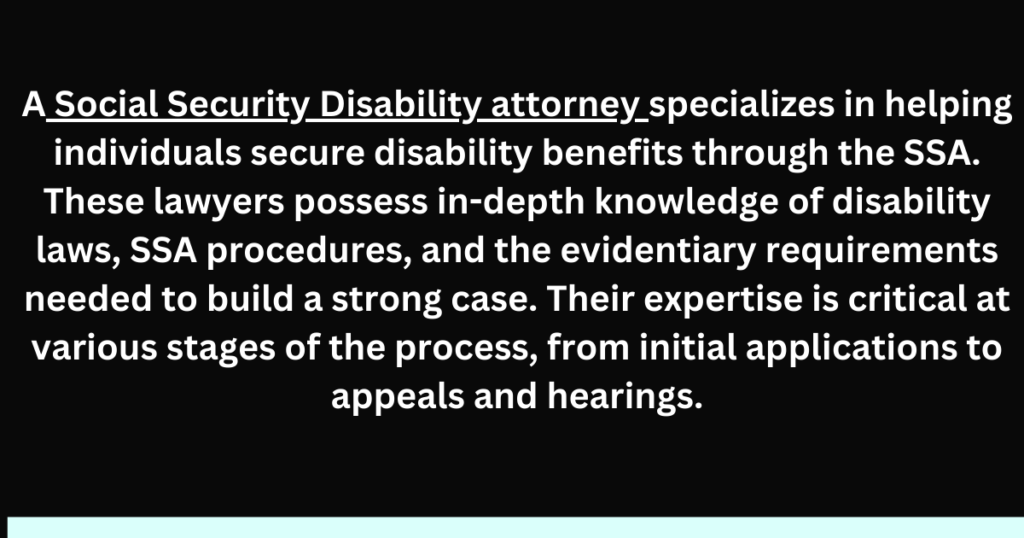For individuals unable to work due to a severe disability, Social Security Disability benefits offer crucial financial support. However, navigating the application process can be challenging, often requiring extensive documentation, persistence, and an understanding of legal nuances. This is where a Social Security Disability (SSD) attorney becomes invaluable. By guiding clients through the complexities of the Social Security Administration (SSA) system, these legal professionals increase the chances of approval and ensure their clients receive the benefits they deserve.
What is a Social Security Disability Attorney?
A Social Security Disability attorney specializes in helping individuals secure disability benefits through the SSA. These lawyers possess in-depth knowledge of disability laws, SSA procedures, and the evidentiary requirements needed to build a strong case. Their expertise is critical at various stages of the process, from initial applications to appeals and hearings.

Understanding Social Security Disability Benefits
The SSA administers two primary programs for disabled individuals:
1. Social Security Disability Insurance (SSDI)
- Designed for individuals who have worked and paid into the Social Security system through payroll taxes. Eligibility is based on the number of work credits earned and the severity of the disability.
2. Supplemental Security Income (SSI)
- Provides financial assistance to disabled individuals with limited income and resources, regardless of work history. SSI is need-based, with strict income and asset limits.
Both programs require applicants to demonstrate a qualifying disability as defined by the SSA.
The Role of a Social Security Disability Attorney
1. Case Evaluation
- Attorneys assess the merits of a case by reviewing medical records, work history, and other relevant documentation to determine eligibility for SSD benefits.
2. Application Assistance
- Many initial SSD applications are denied due to incomplete information or errors. An attorney ensures the application is accurate, comprehensive, and compelling.
3. Medical Evidence Collection
- Gathering strong medical evidence is vital to proving disability. Attorneys work with healthcare providers to obtain detailed records and, if necessary, arrange for additional evaluations or expert opinions.
4. Communication with the SSA
- Lawyers act as intermediaries, handling correspondence with the SSA and ensuring deadlines are met.
5. Appealing Denials
- If an application is denied, an attorney prepares and files appeals, which may include:
- Reconsideration: A review of the initial decision.
- Hearing: Representation before an Administrative Law Judge (ALJ).
- Appeals Council: A higher level of review if the ALJ denies the claim.
- Federal Court: As a last resort, cases can be taken to federal court.
6. Representation at Hearings
- Attorneys advocate for clients during ALJ hearings, presenting evidence, questioning witnesses, and making legal arguments to support the claim.
7. Maximizing Benefits
- Lawyers ensure clients receive the maximum benefits to which they are entitled, including back pay and future payments.
Why Are SSD Applications Denied?
The SSA denies a significant percentage of initial disability claims. Common reasons for denial include:
1. Insufficient Medical Evidence
- Failing to provide adequate proof of a disabling condition.
2. Earning Too Much Income
- Applicants earning above the SSA’s substantial gainful activity (SGA) limit are ineligible.
3. Failure to Follow Medical Treatment
- Not adhering to prescribed treatments without valid reasons can result in denial.
4. Short-Term or Partial Disabilities
- The SSA only considers long-term, total disabilities.
5. Lack of Cooperation
- Missing deadlines, failing to attend SSA-requested exams, or providing incomplete information can hinder approval.
Benefits of Hiring a Social Security Disability Attorney
1. Increased Approval Odds
- Studies show that applicants represented by attorneys are more likely to be approved for benefits.
2. Expertise in Navigating Complexities
- SSD attorneys understand the intricate SSA rules and regulations, helping clients avoid common pitfalls.
3. Stress Reduction
- The disability application process can be overwhelming. Attorneys handle the heavy lifting, allowing clients to focus on their health.
4. No Upfront Costs
- Most SSD attorneys work on a contingency fee basis, meaning clients pay only if their claim is approved. Fees are typically capped by the SSA.
5. Stronger Appeals
- With a lawyer’s guidance, appeals are more structured, evidence-backed, and persuasive.
Key Qualities to Look for in an SSD Attorney
When selecting a Social Security Disability attorney, consider the following:
1. Experience
- Look for a lawyer with a proven track record of handling SSD cases.
2. Specialization
- Attorneys specializing in disability law are better equipped to navigate the SSA’s processes.
3. Reputation
- Check reviews, testimonials, and references to gauge credibility.
4. Communication
- Choose a lawyer who communicates clearly and keeps clients informed throughout the process.
5. Dedication
- A committed attorney will fight diligently to secure the benefits you need.
Steps in the SSD Application Process
1. Initial Application
- Submit detailed personal, medical, and work history information to the SSA.
2. Reconsideration
- If denied, request a reconsideration within 60 days. This involves a fresh review by the SSA.
3. Administrative Hearing
- Present your case before an ALJ, with your attorney advocating on your behalf.
4. Appeals Council Review
- If the hearing decision is unfavorable, request a review by the SSA Appeals Council.
5. Federal Court Appeal
- File a lawsuit in federal court if all other levels of appeal are unsuccessful.
Real-Life Impact of SSD Attorneys
Case Study 1: Degenerative Disc Disease
- A factory worker suffering from debilitating back pain was initially denied SSDI benefits. Her attorney gathered additional medical evidence, secured a favorable testimony from a vocational expert, and won the case at the ALJ hearing.
Case Study 2: Mental Health Disability
- A teacher diagnosed with severe depression and anxiety struggled to prove the impact of her condition on her ability to work. With the help of an attorney, she provided comprehensive documentation and expert opinions, resulting in approval.
Case Study 3: Multiple Denials Overturned
- A construction worker with chronic obstructive pulmonary disease faced multiple denials. His attorney pursued the case through every level of appeal, eventually winning benefits in federal court.
Common Misconceptions About SSD Attorneys
1. “I Don’t Need a Lawyer for My Initial Application.”
- While it’s possible to apply independently, errors or omissions can lead to delays and denials. Attorneys ensure applications are thorough and well-prepared.
2. “Hiring a Lawyer is Too Expensive.”
- SSD attorneys work on contingency, meaning there’s no upfront cost. Fees are deducted from retroactive benefits and capped by the SSA.
3. “All Lawyers Are the Same.”
- Experience and specialization matter. Choose an attorney with a focus on disability law for the best results.
Conclusion
Navigating the Social Security Disability process can be daunting, particularly for individuals already grappling with the challenges of a severe disability. A skilled SSD attorney provides the expertise, advocacy, and support needed to secure the benefits you deserve. Whether you’re applying for the first time or appealing a denial, hiring a Social Security Disability attorney is a step toward financial stability and peace of mind.
